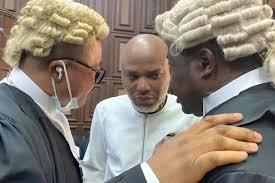News Investigators/ The Federal High Court in Abuja stood down proceedings to deliver ruling on the admissibility of the evidence sought to be tendered by the Federal Government in the ongoing trial of Nnamdi Kanu, leader of the proscribed Indigenous People of Biafra (IPOB).
Justice James Omotosho stood down the matter after FG’s counsel, Suraj Saida, SAN, and Kanu’s lawyer, Paul Erokoro, SAN, adopted their written addresses and argued their case for and against the propriety of the evidence.
The News Agency of Nigeria (NAN).reports that Justice Omotosho, on Wednesday, ordered a trial-within-trial following Kanu’s rejection of the extra-judicial statements sought to be tendered by the prosecution.
The IPOB leader had alleged that the statements were made by him under duress.
Kanu alleged that DSS officials, who interrogated him, denied him access to his lawyer, threatened not to allow him on bail and deny him the one hour granted him daily to receive fresh air in view of his health challenge.
He said he was threatened by a DSS investigator, who he described as Mr Brown Ukuaba, an Assistant Director, of Investigation.
He also alleged that his interrogators asked him to say things about ex-President Jonathan and former Gov. Rochas Okorocha of Imo, which were not his words.
He said he was kept in an underground cell and in solitary confinement.
He claimed that the video recordings played in court were edited.
The FG’s witness, a DSS operative, however debunked the allegations, saying they were untrue.
The witness insisted that Kanu was never subjected to coercion and that all the complaints he raised were addressed.
He denied that Kanu was subjected to any form of duress or coercion.
The witness faulted Kanu’s claim that he was kept in solitary confinement in an underground cell and that he suffered from any ill-treatment.
He said Kanu was given preferential treatment and served bottled water during the interview sessions.
The witness said he was surprised to hear the allegations made by the defendant.
He also denied that anyone asked Kanu to say things about Jonathan and Okorocha, adding that Kanu “spoke voluntarily and truthfully in the interviews.”
Justice Omotosho then ordered the conduct of a trial-within-trial to ascertain the voluntariness or otherwise of Kanu’s statements.
NAN


